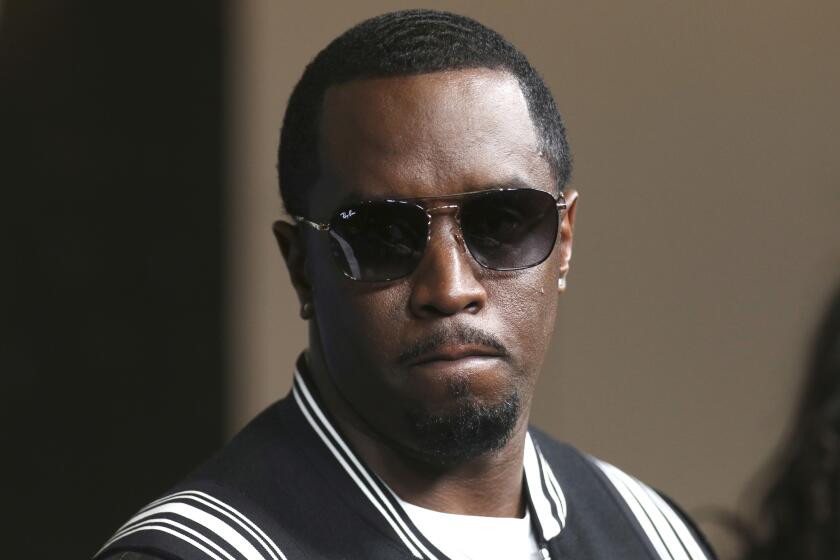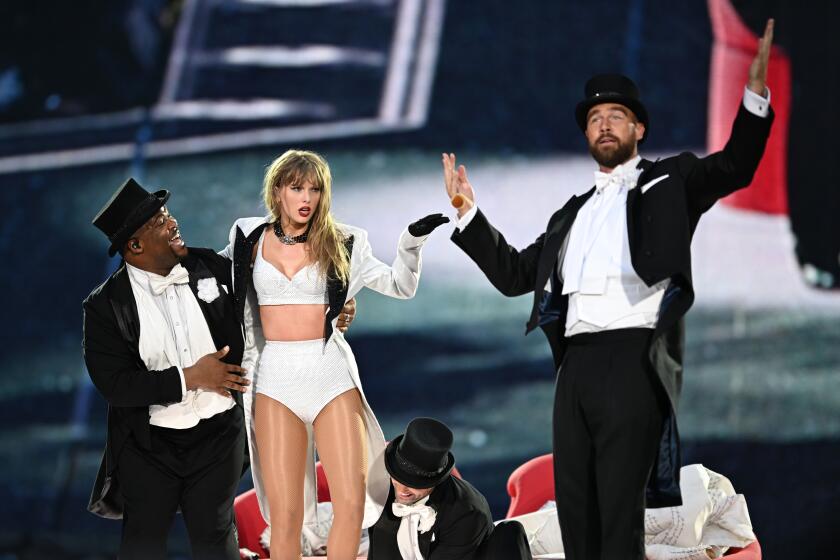Comes a time for a tux
If an elite black-tie awards dinner in Beverly Hills isn’t No. 1 on the list of Neil Young’s Least Favorite Hangouts, it’d be a lock for the Top 5.
Yet there was the elusive, unpredictable rocker Monday at the Beverly Hilton Hotel among 800 music industry heavyweights -- guest of honor, no less, at the American Society of Composers, Authors and Publishers’ annual pop music awards.
After stepping off the red carpet, pausing while a battery of photographers snapped shots, Young, beer in hand, cracked that enigmatic half-smile and conceded that he doesn’t do this sort of thing much.
Who’d expect anything less from a key voice of the ‘60s counterculture, a man known for flouting convention routinely through a twisting, turning career, who rarely turns up at high-end industry parties -- and when he does it’s often in a flannel shirt and well-worn jeans?
In 1997, Young boycotted the Rock and Roll Hall of Fame awards when he was inducted as a member of Buffalo Springfield because he didn’t think the ceremony should be televised.
“I decline to take part in this TV presentation and be trotted out like some cheap awards show,” he said then. “There are already too many of these.”
On Monday, however, he arrived for the “creative black-tie” event in a sharp, Westernized black tux, black shirt and striking black-and-silver bolo tie. He may have left the flannel and denim at home on his remote Northern California ranch, but he brought his sense of humor.
Accepting ASCAP’s highest songwriting honor, the Founders Award, Young gazed into an idealized future and told the 800 onlookers: “I guess my mission will be to boldly go where no hippie has gone before.”
Because ASCAP’s event recognizes songwriters rather than performers or record sales, it has special meaning for many.
“That’s why I’m here,” the 59-year-old Canadian said.
Still, it’s anybody’s guess how seriously one of pop music’s most mercurial artists would look on an event that honored Joni Mitchell and Ashlee Simpson on the same night.
Young, however, said “I’m speechless” at joining such previous winners as Mitchell, Burt Bacharach and Hal David, Stevie Wonder, and Paul McCartney. (BMI, the other major U.S. performing rights group, was scheduled to give its top award the next night to Paul Simon.)
Later, Young was anything but, extemporizing a six-minute acceptance speech that started with a long, heartfelt tribute to his wife, Pegi, for sticking through each of his careening career twists and turns during their 27-year marriage.
“A lot of relationships have gone down the tubes at the hands of the muse,” he said, looking toward the table where Pegi sat with their children, Amber and Ben, as well as Neil’s older son, Zeke, with actress Carrie Snodgress.
He acknowledged the other honorees, many of them R&B; and hip-hop artists including Usher, OutKast’s Big Boi and producer-writer-rapper Jermaine Dupri, whose work ranked among 2004’s most performed songs by ASCAP members.
“I can’t rap,” Young said wryly. “I think I’ve done everything else, so if I start to do that, just shoot me,” he quipped. He quickly added, “But I love good rap. And most things I like do turn up in some form, so keep your eyes peeled.”
Indeed, if there’s been a constant through his storied career it would be the element of surprise. That facet of Young’s personality figured into salutary comments from music industry veteran Mo Ostin, head of Warner Bros. Records during the majority of Young’s years with the company’s Reprise label.
Ostin referred to “the honor of working with, and for, Neil Young,” noting that when Young had produced hits such as “Heart of Gold” “it was a very profitable honor.... It hasn’t always been an easy honor” and outlined some of the requests Young made of label executives over the years, including one that they print the covers for his 1972 “Harvest” album on biodegradable paper.
Ostin outlined how Young typically came to the label’s offices when he’d finished recording a new album to play it for execs and invite their comments.
“We’d tell him what we thought,” Ostin said, “and then Neil would decide whether he wanted to make any changes.”
Young, who exhibited no ill effects of his recent treatment for a brain aneurysm, made no attempt to explain why he, more than virtually any other rocker born of the ‘60s, has remained hip among succeeding generations of listeners and musicians.
“I’ve been at the top and I’ve been at the bottom,” Young said, “I’ve been a has-been. But I just do what I do and every few years things come back around again.”
Echoing that theme of deja vu, Young said, “Fortunately, tomorrow I’ll be going in to play my new record for my label.”
More to Read
The biggest entertainment stories
Get our big stories about Hollywood, film, television, music, arts, culture and more right in your inbox as soon as they publish.
You may occasionally receive promotional content from the Los Angeles Times.






